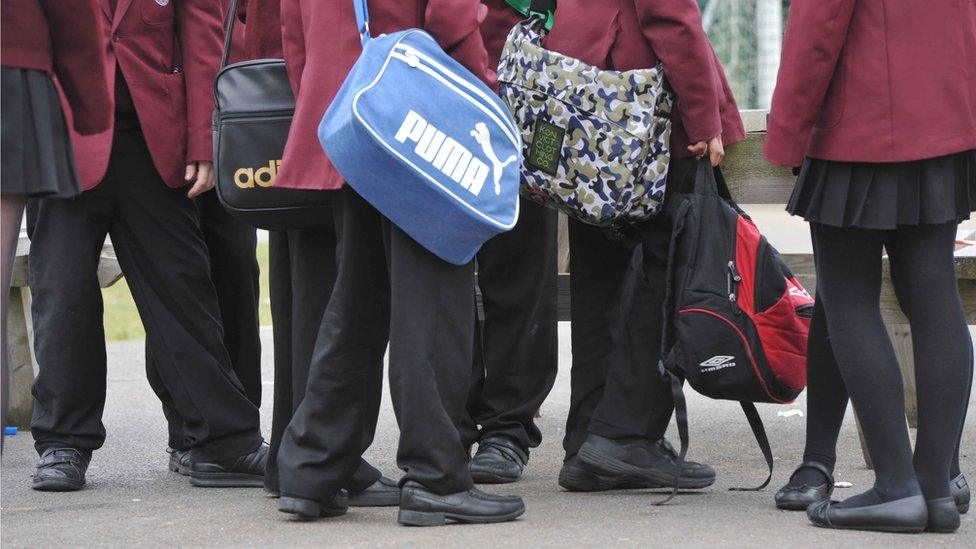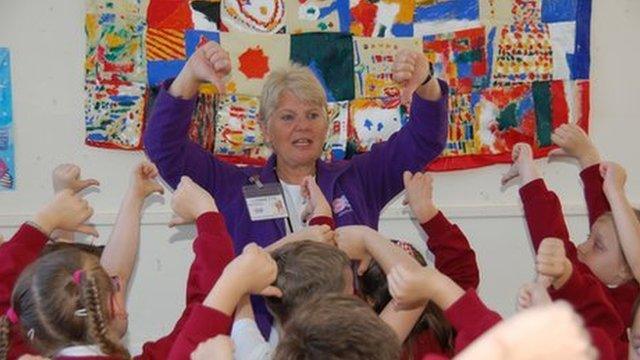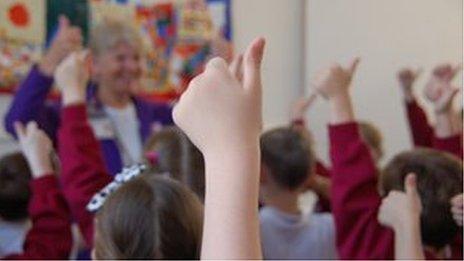Harassment: Girls 'wear shorts under school skirts'
- Published

Girls are wearing shorts under their school skirts to avoid sexual harassment, MPs have heard.
Experts told the Women and Equalities Committee, external that online pornography had led to increased acceptance of sexual violence and harassment towards women.
A "normalised culture of sexual harassment" in England's schools meant girls were changing their behaviours, rather than boys being challenged.
And change would come only with a shift in attitude among the wider population.
The Women and Equalities Committee is conducting an investigation into the extent of sexual harassment and violence in England's schools.
Sophie Bennett, co-director of UK Feminista, told the committee: "We've heard from girls who tell us you don't leave school as a girl without being called a slut, that to wear shorts under your skirt to prevent boys revealing your underwear in the playground is just normal behaviour.
"So there is that sense of a normalised culture of sexual harassment in schools where girls don't feel able to report it and instead change their own behaviour such as wearing shorts under their skirts."
Susie McDonald, chief executive officer of the healthy relationship charity Tender, said she had asked at one London school how sexual harassment could be stamped out and had been told "if the girls can wear trousers".
"So it's about behaviour changing among girls, rather than saying, 'Boys, don't be touching the girls,'" she said.
The expert witnesses told the committee that a large part of the problem was that the wider society tolerated such behaviour towards women and girls.
"We need to be teaching not only how girls change their behaviour - we need to be addressing the harmful attitudes that underpin violence against women and girls," Ms Bennett told the MPs.
Dr Fiona Vera-Gray, research fellow at Durham University, said it was important not to look at schools in isolation.
"Teachers in schools are also living in a world where victim blaming is prevalent and where we've got all these things that are leading to this normalisation of sexual violence and harassment towards adult women.
"To fix what's going on in schools we also need to think more broadly about changing attitudes in the general population."
Online pornography
The role of online pornography in sexual violence and harassment was widely discussed at the committee's hearing.
Jo Sharpen, policy manager at Against Violence and Abuse, said pornography was confusing young people's perception of sexual consent.
"Young people, because they're not getting the quality SRE [sex and relationships education] that they need in schools, are looking to things like porn to get that advice, that education, and it gives such unrealistic and harmful attitudes about gender, sex and consent."
Marai Larasi, executive director of black feminist organisation Imkaan, said young people - who could now access pornography easily on a smartphone - were being given unrealistic and unacceptable messages about sex and intimacy.
"What's happened over the past few years is pornography which would have been considered hardcore pornography, which would have operated on the peripheries, is now the mainstream pornography... and involves the routine punishment of women's bodies as entertainment.
"We are doing this to our children and young people - are boys behaving in these ways because we haven't intervened early enough and we haven't helped to actually construct them as a different version of what a young man could look like?
"We are culpable - young people are simply acting in ways that we've taught them to act".
Ofsted checks
Lynnette Smith, founder of SRE provider Big Talk Education, said schools would pay more attention to issues of sexual harassment if they knew Ofsted inspectors would ask questions.
"Ofsted needs to be asking in every school, 'What is the parental involvement, what are the results you're getting from young people, what are the questions that children are asking?'
"If schools know they're going to be asked this - and it's all part of safeguarding and wellbeing - then it will happen."
Ms Bennett said: "As it stands, sexism isn't listed alongside racist, disability and homophobic bullying in Ofsted's inspection framework, and the message that that sends out is that really sexual harassment isn't a priority, you don't need to worry about it, so it's hugely important that that changes.
"Department for Education (DfE) guidance on preventing and tackling bullying, external and prejudice doesn't include a single resource on sexism or sexual harassment, again sending out that same message, that this is okay, it's normal, we don't need to worry about it and it certainly isn't a priority."
A DfE spokesman said no young person should be made to feel unsafe or suffer harassment.
"Schools are safe places and fortunately crime in schools is very rare, but sexual assault of any kind is an offence and must always be reported to the police.
"We are also working with leading head teachers and practitioners to look at how to raise the quality of PSHE teaching, which includes sex and relationship education."
A spokeswoman for Ofsted said: "In all inspections, Ofsted assesses how effectively schools are safeguarding their pupils - including their effectiveness in keeping pupils safe from all forms of abuse.
"Ofsted's school inspection handbook makes clear that to be judged good or better, the leadership at a school will 'take appropriate action to identify pupils who may be at risk of neglect, abuse or sexual exploitation, reporting concerns and supporting the needs of those pupils'."
In September 2015, a BBC News report based on freedom of information requests revealed there were 5,500 sexual offences recorded in UK schools between 2011 and 2014.
Within these figures, there were 4,000 alleged physical sexual assaults and more than 600 alleged rapes, according to the information from UK police forces.
- Published19 April 2016

- Published6 September 2015

- Published22 March 2016

- Published20 October 2013
